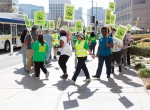The Supreme Court decreased labor unions’ power by ruling against nonmember fees Wednesday morning.
In a 5-4 decision along party lines, the conservative-leaning court decided that unions can no longer charge fair share fees to those who choose not to join. Twenty-two states including California allow public-sector unions to collect fees from workers who opt out of membership in order to pay for the union’s collective bargaining.
Janus v. American Federation of State, County, and Municipal Employees overturns precedent from Abood v. Detroit Board of Education, a 1977 decision in which the court ruled that public unions could charge nonmember fees as long as they were solely used for bargaining and not political activities, since the court has long held that money constitutes speech.
Mark Janus, a child support specialist in Illinois, argued that unions’ actions are inherently political, and therefore paying fees violated his First Amendment right to free speech.
Public labor unions are legally bound to represent every employee in their units, and AFSCME argued fees such as Janus’ were created to avoid free riding. However, Justice Samuel Alito, who wrote the majority opinion of the court, said nonmembers like Janus do not benefit from the union’s activities since they may not agree with the union’s stances and actions.
The court deadlocked in a similar 2016 case, Friedrichs v. California Teachers Association, following the death of conservative Justice Antonin Scalia. His vacancy was filled by Justice Neil Gorsuch, who joined the court in April 2017. Gorsuch has cast the deciding vote in multiple cases this session.
Critics have said government unions will likely face a decrease in revenue, power and membership numbers.
[Related link: Union members protest Supreme Court case on nonunion fees]
Kathryn Lybarger, president of AFSCME Local 3299, the University of California’s largest employee union, said she thinks the decision will perpetuate labor abuses.
“The court’s ruling will normalize wage theft, income inequality, discrimination, and other labor abuses by effectively forcing the only private organizations that exist to correct these injustices to deliver their services for free,” she said.
AFSCME 3299 said in a statement that the ruling will reduce wages and hurt the economy since workers can no longer be required to pay for the cost of bargaining.

“The court’s ruling will normalize wage theft”
It sounds like “fair share fees” were “normalized wage theft”…